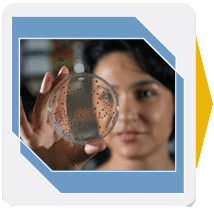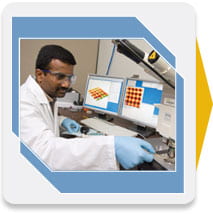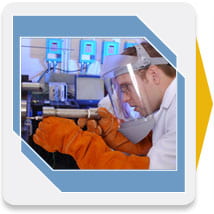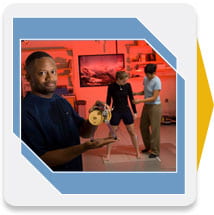Industry/University/Government Collaboration Methodologies
Innovations that solve societal problems and lead to positive economic impacts often result from collaboration between research-intensive universities and external partners. Therefore, the impact of innovation ecosystems, where invention, insight, and translations of ideas to products happen through a systematic collective outcome of companies, non-profits, government agencies, educational and research institutions working together, is unparalleled.
Industry Engagement Modes and Methods
The Flex@Tech vision is to enable a global ecosystem beginning with the co-design of chips, packages, and systems that also includes advances in materials, processes, substrates, sensors, through to the assembly, interconnect, encapsulation, and testing of flexible electronics, which engages industry, academia, and government agencies during the performance of basic research through to the realization of new products which incorporate new or incremental discoveries. Towards this goal, the Flex@Tech industry engagement model consists of a multi-level, tiered-value proposition for industry participation with Georgia Tech academic and research faculty, programs, and centers.
-
Partnering Via the Flexible Hybrid Electronics Manufacturing Innovation Institute
In August 2015, the U.S. Department of Defense (DoD) awarded the FlexTech Alliance a Cooperative Agreement to establish and manage a Manufacturing Innovation Institute (MII) for Flexible Hybrid Electronics (FHE MII). The award is for $75 million in federal funding over a five-year period and is being matched by more than $96 million in cost-sharing from non-federal sources, including the City of San Jose, private companies, universities, several U.S. states, and not-for-profit organizations. FlexTech Alliance’s winning proposal results in the first of seven MIIs to be headquartered on the West Coast. The DoD’s Manufacturing Technology Program Office (ManTech) oversees the MIIs. Georgia Tech is a founding member of the FHEMII.

-
Partnering Via the Research Contract Continuum
At Georgia Tech, investing in research is a top priority. As part of that commitment, the university has developed four contract mechanisms that enable industry to engage with Georgia Tech researchers at all stages of R&D. These agreements were carefully crafted to streamline the contracting process and provide straightforward intellectual property terms for companies engaging in collaborative research. The four contracting mechanisms are as follows: –
Basic Research: Explore fundamental challenges in a technical area
Applied Research: Identify solutions to real-world challenges
Demonstration: Improve existing technology
Specialized Testing: Test new and existing products
For more information, FAQs, and other details pertaining to the Georgia Tech Contract Continuum, please visit our Industry Engagement site at http://industry.gatech.edu/contract-continuum-researchers.
| BASIC RESEARCH Explore fundamental challenges in a technical area As one of the nation’s top research universities, Georgia Tech is committed to conducting basic research that advances our fundamental understanding of the world. This form of research is typically driven by scientific questions that lay the foundation for technological progress. When Georgia Tech collaborates with industry via a Basic Research agreement, the industry partner has the opportunity to license the resulting intellectual property (IP). These early collaborations are often the foundation for new products that spur business growth for a company.
APPLIED RESEARCH
DEMONSTRATION
SPECIALIZED TESTING |
contacts For collaboration information
|
|






